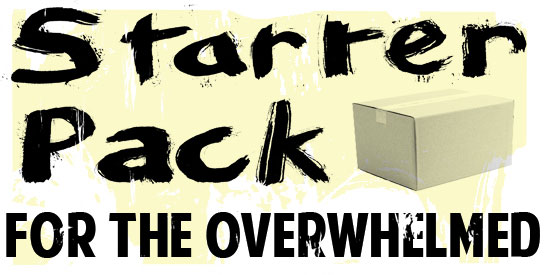
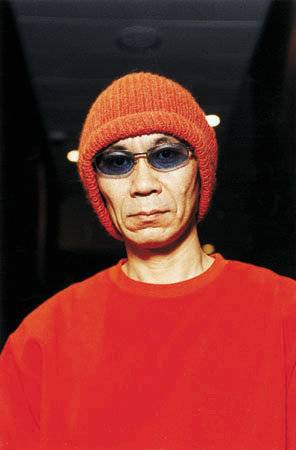 Other than Jess Franco and porn directors, there is no other director with a more overwhelming filmography than the prolific Takashi Miike. Amazingly, and making things more daunting, his is a career that only began in the early 90s. With over eighty films and television shows to his credit, it’s terrifying to think how many there will be in another decade. Miike has slowed down in recent years – by “slowed down” I mean that now he directs two or three films a year, compared to six or seven. Despite the international acclaim for 13 Assassins (2010), a lot of Miike’s fans have abandoned him and like to claim that he has lost his touch. The bulk of his original followers seem to consider him lost after 2004. Personally, I don’t see it. Miike’s films have certainly changed and Miike has become a far more commercial director, but it’s not hard to find that special Miike touch even in his most mainstream works. Usually for Starter Pack for the Overwhelmed, we choose five films that either best represent a director or are simply his or her’s best. In this case, due to the magnitude of his output, I’ll be choosing ten films rather than five. These are what I consider to be Miike’s best films and, because Miike works in such a wide range of genres, I believe they also give a decent representation of his career as a whole. I should point out that I’ve not seen all of Miike’s films; I’ve probably seen around sixty at this point. In no particular order, here we go…
Other than Jess Franco and porn directors, there is no other director with a more overwhelming filmography than the prolific Takashi Miike. Amazingly, and making things more daunting, his is a career that only began in the early 90s. With over eighty films and television shows to his credit, it’s terrifying to think how many there will be in another decade. Miike has slowed down in recent years – by “slowed down” I mean that now he directs two or three films a year, compared to six or seven. Despite the international acclaim for 13 Assassins (2010), a lot of Miike’s fans have abandoned him and like to claim that he has lost his touch. The bulk of his original followers seem to consider him lost after 2004. Personally, I don’t see it. Miike’s films have certainly changed and Miike has become a far more commercial director, but it’s not hard to find that special Miike touch even in his most mainstream works. Usually for Starter Pack for the Overwhelmed, we choose five films that either best represent a director or are simply his or her’s best. In this case, due to the magnitude of his output, I’ll be choosing ten films rather than five. These are what I consider to be Miike’s best films and, because Miike works in such a wide range of genres, I believe they also give a decent representation of his career as a whole. I should point out that I’ve not seen all of Miike’s films; I’ve probably seen around sixty at this point. In no particular order, here we go…
It was really hard not to include these:
Dead or Alive (1999), Dead or Alive 2: Birds (2000), The Great Yokai War (2005), The Way to Fight (1996), Yatterman (2009), Crows Zero (2007), 13 Assassins (2010), Deadly Outlaw Rekka (2002), Fudoh: The New Generation (1996), Like a Dragon (2007), Big Bang Love, Juvenile A (2006), Graveyard of Honor (2002)
AUDITION (1999)
Original title: Ôdishon
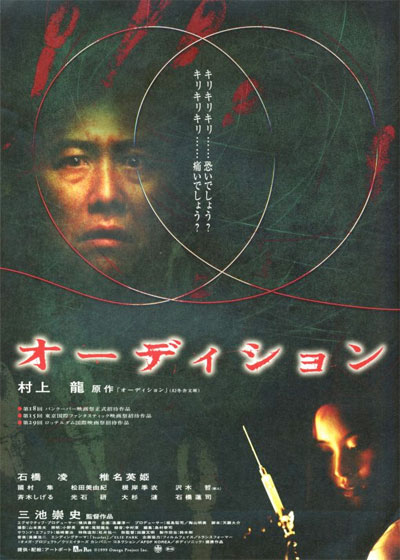 Audition is a must-see not only for supporters of Miike, but for anyone remotely interested in horror. This grueling piece of work is the film that truly brought Takashi Miike to the attention of the cinema world outside of Japan, and it’s easy to see why. Audition is a slow-burning film that finishes with an unforgettable finale that has already made its way into the history books of horror. However, there is more than just gore and torture. Based on a book by the famous Ryū “In the Miso Soup” Murakami (not to be confused with Haruki Murakami), there is a fascinating subtext to Audition once you scratch underneath its crusted surface.
Audition is a must-see not only for supporters of Miike, but for anyone remotely interested in horror. This grueling piece of work is the film that truly brought Takashi Miike to the attention of the cinema world outside of Japan, and it’s easy to see why. Audition is a slow-burning film that finishes with an unforgettable finale that has already made its way into the history books of horror. However, there is more than just gore and torture. Based on a book by the famous Ryū “In the Miso Soup” Murakami (not to be confused with Haruki Murakami), there is a fascinating subtext to Audition once you scratch underneath its crusted surface.THE BIRD PEOPLE IN CHINA (1998)
Original title: Chûgoku no chôjin
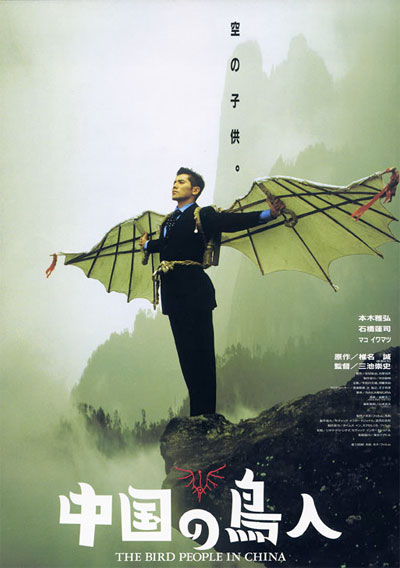 The Bird People in China is a good film to show to those only familiar with Miike’s more extreme works. While the yakuza is present in this film, there is no outrageous violence to be found. Instead we have a gentle and meditative film that can be as touching as it is humorous. The Bird People in China is often toted as Miike’s best, and it is certainly close to my favourite. This is an entry that can be comfortably screened to practically anyone without danger of causing offense. Why not watch this one with your mum?
The Bird People in China is a good film to show to those only familiar with Miike’s more extreme works. While the yakuza is present in this film, there is no outrageous violence to be found. Instead we have a gentle and meditative film that can be as touching as it is humorous. The Bird People in China is often toted as Miike’s best, and it is certainly close to my favourite. This is an entry that can be comfortably screened to practically anyone without danger of causing offense. Why not watch this one with your mum?THE HAPPINESS OF THE KATAKURIS (2001)
Original title: Katakuri-ke no kôfuku
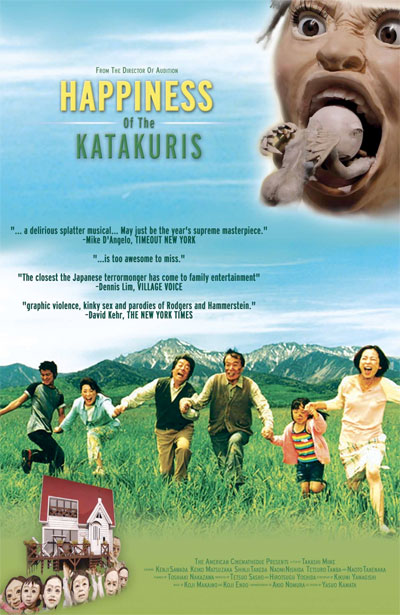 I think it was The Happiness of the Katakuris that made me realise that I was falling deeply in love with the films of Takashi Miike. From its insane claymation opening (a sequence which was weakly recreated in 2007’s Sukiyaki Western Django – one of Miike’s lesser films, despite being available internationally) to its wonderfully nutty musical numbers, The Happiness of the Katakuris is a jaw-dropping experience. The story focuses on a family – down on their luck – attempting to run a country hotel. Every time they have a guest, the guest ends up dead. Don’t be fooled by its seemingly dark themes, The Happiness of the Katakuris is hilarious and contains the best cast Miike has ever worked with. Every character is beautifully defined and performed excellently. Annoyingly, some of the DVD versions of this have terrible subtitles that leave out half the dialogue (the British Tartan DVD is guilty). The best subtitled version I’ve seen appeared on SBS Television in Australia. I’m not sure how the American disc fairs.
I think it was The Happiness of the Katakuris that made me realise that I was falling deeply in love with the films of Takashi Miike. From its insane claymation opening (a sequence which was weakly recreated in 2007’s Sukiyaki Western Django – one of Miike’s lesser films, despite being available internationally) to its wonderfully nutty musical numbers, The Happiness of the Katakuris is a jaw-dropping experience. The story focuses on a family – down on their luck – attempting to run a country hotel. Every time they have a guest, the guest ends up dead. Don’t be fooled by its seemingly dark themes, The Happiness of the Katakuris is hilarious and contains the best cast Miike has ever worked with. Every character is beautifully defined and performed excellently. Annoyingly, some of the DVD versions of this have terrible subtitles that leave out half the dialogue (the British Tartan DVD is guilty). The best subtitled version I’ve seen appeared on SBS Television in Australia. I’m not sure how the American disc fairs.BLUES HARP (1998)
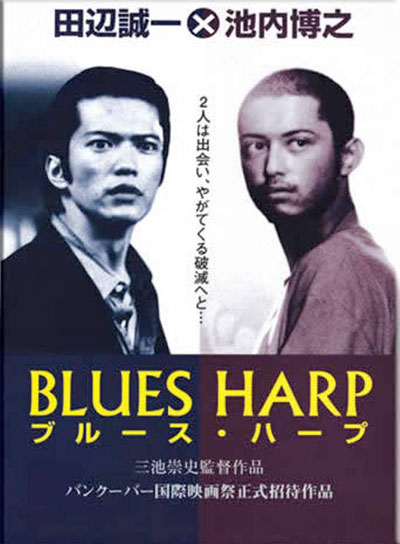 Miike has made a lot of yakuza films. But no yakuza film in his credits is quite like Blues Harp. Sensitive and surprisingly heartfelt, Blues Harp does not contain the strange structuring and slightly-off logic found in the majority of Miike’s work. Instead it is simply a great drama and an excellent (and often sad) comment on ambition. Similar in theme to Graveyard of Honor (2002) but entirely different in execution, Blues Harp follows the attempts of a young yakuza member to violently take over from his boss. Meanwhile, we watch the ascent of an unambitious blues harp player – and occasional yakuza lackey – as he accidentally becomes a popular musical act at the bar he works in. While the film sticks to conventions, this is seriously solid filmmaking and a great example of the wide array of skills Miike possesses.
Miike has made a lot of yakuza films. But no yakuza film in his credits is quite like Blues Harp. Sensitive and surprisingly heartfelt, Blues Harp does not contain the strange structuring and slightly-off logic found in the majority of Miike’s work. Instead it is simply a great drama and an excellent (and often sad) comment on ambition. Similar in theme to Graveyard of Honor (2002) but entirely different in execution, Blues Harp follows the attempts of a young yakuza member to violently take over from his boss. Meanwhile, we watch the ascent of an unambitious blues harp player – and occasional yakuza lackey – as he accidentally becomes a popular musical act at the bar he works in. While the film sticks to conventions, this is seriously solid filmmaking and a great example of the wide array of skills Miike possesses.RAINY DOG (1997)
Original title: Gokudô kuroshakai
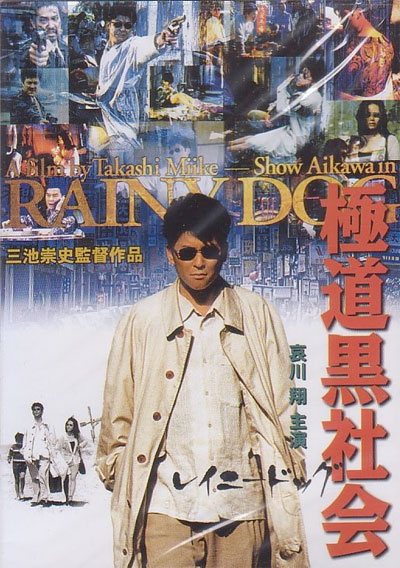 Rainy Dog is another yakuza film that breaks the mold. The film follows a discarded ex-yakuza, banished to Taiwan, who takes the occasional assassination job to pay the bills. An ex-girlfriend drops a child off at his home, claiming it is his son. He attempts to ignore his son – who follows him around like a stray dog – all while becoming the target of some heavyweight gangsters. Rainy Dog is not only a showcase of Miike’s abilities, it also presents a tour de force courtesy of its leading man – Shô Aikawa (the star of many Miike films) in what is one of his best roles. Rainy Dog is a great looking film. Its locations, the constant rain and Miike’s restrained camerawork all work perfectly in creating a quietly impressive yakuza film. This is more about characters than action, but the film’s final scenes still pack a punch.
Rainy Dog is another yakuza film that breaks the mold. The film follows a discarded ex-yakuza, banished to Taiwan, who takes the occasional assassination job to pay the bills. An ex-girlfriend drops a child off at his home, claiming it is his son. He attempts to ignore his son – who follows him around like a stray dog – all while becoming the target of some heavyweight gangsters. Rainy Dog is not only a showcase of Miike’s abilities, it also presents a tour de force courtesy of its leading man – Shô Aikawa (the star of many Miike films) in what is one of his best roles. Rainy Dog is a great looking film. Its locations, the constant rain and Miike’s restrained camerawork all work perfectly in creating a quietly impressive yakuza film. This is more about characters than action, but the film’s final scenes still pack a punch.ZEBRAMAN (2004)
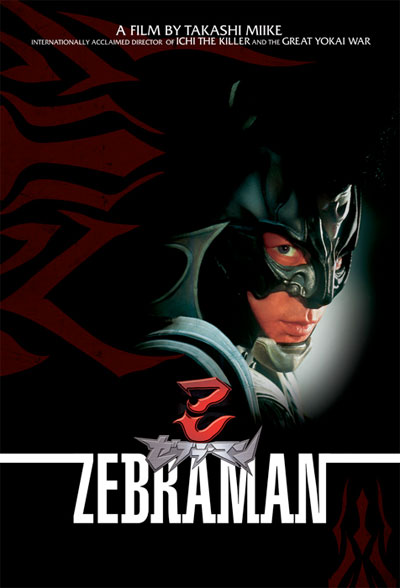 Zebraman is a fan divider. Many see it as the end of the Miike they loved; the point where he turned to commercial filmmaking as his major source of income. To me, Zebraman is one of Miike’s best. His influence can easily be found in the film despite its commercialised elements. Shô Aikawa plays a teacher who gets no respect from his students or family. He is obsessed with an old television show called Zebraman; so obsessed that he creates a Zebraman costume. When aliens begin to possess people around him, he tries his hand at being a superhero. While on the surface it appears to be a family film, Zebraman is filled with odd and kind of adult content. I mean, there is a rapist that dresses as a giant crab, for Christ’s sake! And Shô Aikawa’s relationship with his family reminded me of the demented Visitor Q. Zebraman is fast-paced and enjoyable from start to finish. Sure it’s not as twisted as his more adult works or as thoughtful as something like The Bird People in China, but it undoubtedly a fun and rewatchable movie.
Zebraman is a fan divider. Many see it as the end of the Miike they loved; the point where he turned to commercial filmmaking as his major source of income. To me, Zebraman is one of Miike’s best. His influence can easily be found in the film despite its commercialised elements. Shô Aikawa plays a teacher who gets no respect from his students or family. He is obsessed with an old television show called Zebraman; so obsessed that he creates a Zebraman costume. When aliens begin to possess people around him, he tries his hand at being a superhero. While on the surface it appears to be a family film, Zebraman is filled with odd and kind of adult content. I mean, there is a rapist that dresses as a giant crab, for Christ’s sake! And Shô Aikawa’s relationship with his family reminded me of the demented Visitor Q. Zebraman is fast-paced and enjoyable from start to finish. Sure it’s not as twisted as his more adult works or as thoughtful as something like The Bird People in China, but it undoubtedly a fun and rewatchable movie.GOZU (2003)
Original title: Gokudô kyôfu dai-gekijô: Gozu
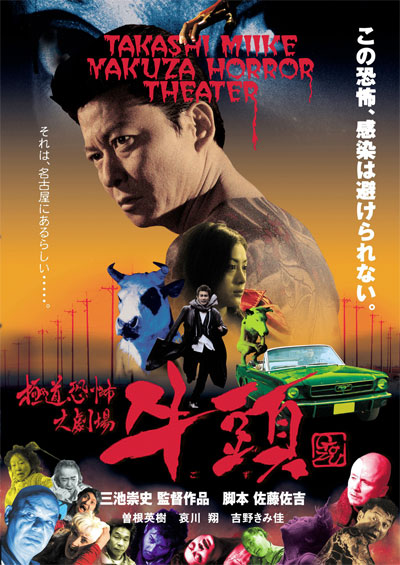 Gozu does something I previously thought impossible. It is somehow both funny and completely disturbing at the same time. Now, I don’t mean that it’s funny one moment then disturbing the next. No, when watching Gozu I find myself laughing at the same time as my palms sweat. Go into Gozu knowing nothing about it (like I did) and be left rocking back and froth crying tears of simultaneous laughter and fear.
Gozu does something I previously thought impossible. It is somehow both funny and completely disturbing at the same time. Now, I don’t mean that it’s funny one moment then disturbing the next. No, when watching Gozu I find myself laughing at the same time as my palms sweat. Go into Gozu knowing nothing about it (like I did) and be left rocking back and froth crying tears of simultaneous laughter and fear.VISITOR Q (2001)
Original title: Bijitâ Q
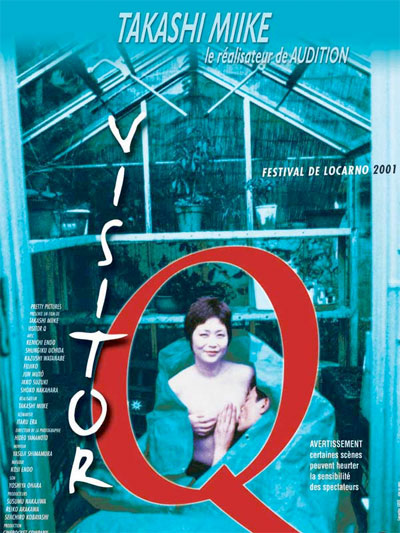 Visitor Q is another Miike film that seemingly does the impossible. It begins unrelentingly grim and downright disgusting (we open with a father screwing his daughter). The film continues down a demented path following a deranged family and becoming more perverse and nauseating at each scene. Yet while it is becoming more insane and increasingly foul, it is somehow starts to become uplifting. By the end, Visitor Q will leave you reasonably happy as if you’d watched a satisfying family drama. You’ll have forgotten the incest, the necrophilia, the child murdering, the house becoming flooded with breast milk… well, perhaps not forget, but it certainly won’t leave you feeling shattered. Shot cheaply on video, Visitor Q shows that Miike can make a masterpiece for practically any amount of money.
Visitor Q is another Miike film that seemingly does the impossible. It begins unrelentingly grim and downright disgusting (we open with a father screwing his daughter). The film continues down a demented path following a deranged family and becoming more perverse and nauseating at each scene. Yet while it is becoming more insane and increasingly foul, it is somehow starts to become uplifting. By the end, Visitor Q will leave you reasonably happy as if you’d watched a satisfying family drama. You’ll have forgotten the incest, the necrophilia, the child murdering, the house becoming flooded with breast milk… well, perhaps not forget, but it certainly won’t leave you feeling shattered. Shot cheaply on video, Visitor Q shows that Miike can make a masterpiece for practically any amount of money.YOUNG THUGS: NOSTALGIA (1998)
Original title: Kishiwada shônen gurentai: Bôkyô
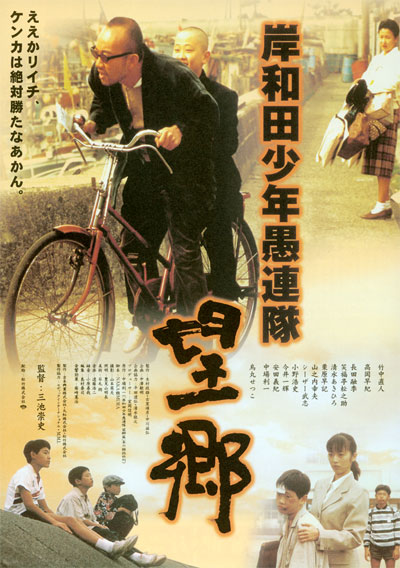 Young Thugs: Nostalgia is a prequel to Young Thugs: Innocent Blood (1997) – which is a sequel itself to a film not directed by Miike – but it does not require you to have viewed the previous entry. Miike was raised in Osaka and he sets many of his films there, usually in the 70s – a period when Miike was a child. These films have a special sense of nostalgia attached to them. And, as its title suggests, there is no better representation of this than Young Thugs: Nostalgia. The film shows a child growing up in a violent atmosphere, but it isn’t given the dramatic and brooding treatment that you’d expect. As Miike biographer Tom Mes has pointed out, Miike likes to show the joy in fighting, specifically the joy children find in fighting. This joy is presented superbly in Young Thugs: Nostalgia, so much so that you forget what you’re watching is can be sometimes shockingly brutal and want to punch a friend in the face.
Young Thugs: Nostalgia is a prequel to Young Thugs: Innocent Blood (1997) – which is a sequel itself to a film not directed by Miike – but it does not require you to have viewed the previous entry. Miike was raised in Osaka and he sets many of his films there, usually in the 70s – a period when Miike was a child. These films have a special sense of nostalgia attached to them. And, as its title suggests, there is no better representation of this than Young Thugs: Nostalgia. The film shows a child growing up in a violent atmosphere, but it isn’t given the dramatic and brooding treatment that you’d expect. As Miike biographer Tom Mes has pointed out, Miike likes to show the joy in fighting, specifically the joy children find in fighting. This joy is presented superbly in Young Thugs: Nostalgia, so much so that you forget what you’re watching is can be sometimes shockingly brutal and want to punch a friend in the face.ICHI THE KILLER (2001)
Original title: Koroshiya 1
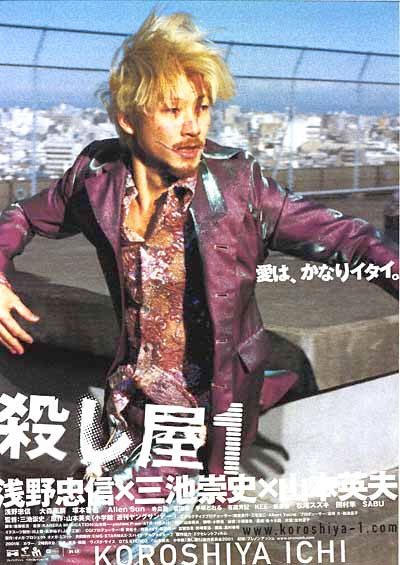 2001 was a damn good year for Takashi Miike. This list contains three films he made in 2001 and the best of those three – and, in my opinion, his best film full stop – is Ichi the Killer. Almost as widely seen as Audition, Ichi the Killer is everything Miike is famous for – for better or worse. It is ultraviolent, playful in its storytelling and full of insane characters obsessed with sadism or masochism. At times it is upsetting in its violence, other times it is cartoonish and hysterical. Ichi the Killer is dripping with energy. Every performance – especially those of its leads; Tadanobu Asano (who recently featured in Thor, weirdly enough) and Nao Ohmori – is passionate and bubbling with excitement. The music, editing, camerawork and even the CGI effects (and I’m someone who despises CGI) are pushed into wild territories. Yes, Ichi the Killer has everything a growing Miike fan requires. It’s also the perfect entry point in showcasing the world of Takashi Miike to a Miike virgin. Love him or hate him, this is undoubtedly his universe.
2001 was a damn good year for Takashi Miike. This list contains three films he made in 2001 and the best of those three – and, in my opinion, his best film full stop – is Ichi the Killer. Almost as widely seen as Audition, Ichi the Killer is everything Miike is famous for – for better or worse. It is ultraviolent, playful in its storytelling and full of insane characters obsessed with sadism or masochism. At times it is upsetting in its violence, other times it is cartoonish and hysterical. Ichi the Killer is dripping with energy. Every performance – especially those of its leads; Tadanobu Asano (who recently featured in Thor, weirdly enough) and Nao Ohmori – is passionate and bubbling with excitement. The music, editing, camerawork and even the CGI effects (and I’m someone who despises CGI) are pushed into wild territories. Yes, Ichi the Killer has everything a growing Miike fan requires. It’s also the perfect entry point in showcasing the world of Takashi Miike to a Miike virgin. Love him or hate him, this is undoubtedly his universe.



